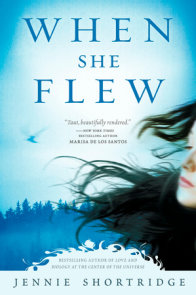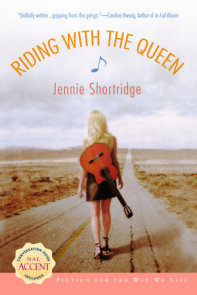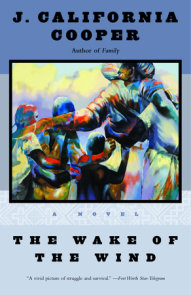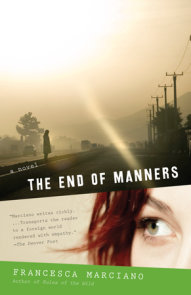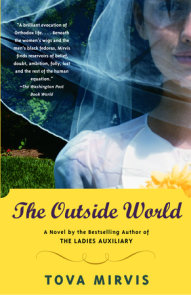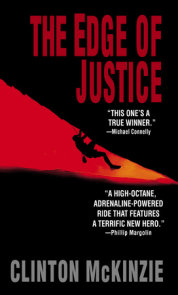READERS GUIDE
Questions and Topics for Discussion
INTRODUCTION
Nothing gets Eleanor Samuels’s heart racing like a double scoop of mocha fudge chunk. Sure, the magazine writer may have some issues aside from food, but she isn’t quite ready to face them. Then her beloved Uncle Benny falls ill, and what at first seems scary and daunting becomes a blessing in disguise. Because while she cooks and cares for him—and enjoys a delicious flirtation with a new chef in town—Eleanor begins to uncover some long-buried secrets about her emotionally frayed family and may finally get the chance to become the woman she’s always wanted to be.
ABOUT JENNIE SHORTRIDGE
A life-long musician and songwriter, Jennie Shortridge first started singing in bars with rock bands at the tender (and illegal) age of 16. She fronted numerous bands in the Denver area for fifteen years and continues to perform in coffee houses in an acoustic duo with her husband Matt. She also has worked in corporate marketing, advertising, and public relations. Besides our publication of Riding with the Queen, her fiction has been published in Byline magazine, and her freelance articles have appeared in Glamour,Mademoiselle, and other national magazines.
A CONVERSATION WITH JENNIE SHORTRIDGE
Q. Eating Heaven is your second novel. How was the experience different from writing Riding with the Queen?
A. Eating Heaven is actually a rewritten version of the first novel I attempted, then stuck in a drawer when I realized it wasn’t very good.
Like Riding with the Queen, it’s a story that’s straight from my heart, inspired by the time I spent with my dad and stepmother, Jeanne, as she was battling pancreatic cancer. After publishing Riding with the Queen, I decided to take another crack at it and began from scratch, using the same basic story and characters as before, but setting it in Portland, a natural for a story involving food. I fell in love with the characters all over again, and when I finished, I had this great sense of satisfaction that their story would finally see daylight.
Q. In Eating Heaven the main character, Eleanor Samuels, becomes the primary caretaker for Uncle Benny, who has a virulent form of cancer. You mention that you were inspired by your own family’s situation. How so?
A. During the five months my stepmother, Jeanne, was ill, our family pulled together in the way families do at such times. I think because her condition was terminal, we all felt helpless and didn’t know what to do. For a good deal of that time, though, she still really liked to eat, so I’d ask her what she felt like having, and then I’d make it for her. At one point she wanted pineapple upside-down cake. I made one and took it to her, and as she ate it, she really seemed to be savoring it. After she finished, she said, “That was so good. I believe that’s the last time I’ll need to eat pineapple upside-down cake.” It struck me as such an acceptance of her situation, even though we never talked about her dying, and I was inspired to write about it first in an essay (published in Mademoiselle in July 1997). In the book, Eleanor and Benny have this same experience, and many others that were inspired by real life. After Jeanne died, I grew closer to my dad, who was on his own for the first time in a long time. I made casseroles and took them to him and we talked on the phone nearly every day. I was inspired to write the relationship between a grown woman and a fatherlike figure because of that time together. It was quiet and simple, but tremendously powerful. Tremendously real.
Q. In the conversation guide for your last novel, Riding with the Queen, you said that you were interested in expressing “themes of tolerance and acceptance.” How did you go about writing toward this in Eating Heaven?
A. Big people are one of the last groups our society thinks it’s okay to discriminate against, stereotype, and make fun of. Ironic when Americans are getting fatter every year, yet fat jokes on TV and in movies are not considered offensive, for some reason. I have plenty of friends who are big, happily or unhappily so, and they’re dealing with the same stuff we all are in our lives. We all have coping mechanisms. The difference with people who eat as a coping mechanism is that you can see the result. I wanted to show readers who Eleanor is and how she battles with eating and weight, body image and self worth—as so many of us do. At the same time, I also wanted to open up the issue of compulsive and binge eating disorders, which are disorders you don’t hear a lot about. The more I researched and talked with women dealing with them, the more I realized how prevalent they are and how dangerous they can be, not only to emotional health but to life itself. These disorders often lead to obesity, which causes something like 300,000 deaths per year in our country. And those who suffer from eating disorders feel horrible about themselves way too much of the time. So again, I wanted to put a human face on what our society thinks of as an unattractive issue.
Q. Eleanor’s sisters are very important to her and to the story. Do you see yourself and your own sisters in them? Do your relationships with your sisters reflect Eleanor’s relationships with Christine and Anne?
A. As with the sisters in Riding with the Queen, not so much—not literally, anyway. However, my relationship with them is why I like to write about sisters. I love how the intricacies of common experience and interconnectedness bond sisters together sometimes and tear them apart at others. I have the kind of sisters who stand up for one another no matter what, and who are there in a heartbeat if one of us is in trouble.
Sure, our relationships are complicated and not always on the best footing, but our loyalty and love for one another surpass all other circumstances. And those are the kinds of sisters I try to write. For me, family has always been my foundation, even when we drive one another crazy.
Q. Portland comes so alive in Eating Heaven—the markets, the weather, “Trendy-third Avenue.” How long have you lived in Portland? Will you set future novels there?
A. I’ve now lived in Portland for more than three years. I began to write Eating Heaven in my first year here, when I was in the romance phase of my relationship with my new hometown, and I think that comes through in the story. Coming from the high and dry desert of Colorado, I found that the Oregon landscape is all about life and growth and renewal, abundance in the form of green everywhere, and water, and a wonderfully creative and bohemian spirit in its people.
I love it, and yes, my next novel takes place both in Portland and on the gorgeous Oregon coast.
Q. Eleanor’s struggles with food will feel familiar, on some level, to many readers. Why do you think the issue of food is so fraught in our society?
A. I think media has become like a drug—a poison, actually—because we let it influence us to do things that are unhealthy or just plain stupid, like not eat, or eat things that don’t taste good and aren’t doing our bodies any good. We buy in to what they’re showing us rather than take a look around at the real world and realize that most people will never look like models, nor should they. Why are we more desirable and lovable if we look like the current “perfect person” prototype? It changes with every generation, anyway. Why not just be a good, healthy you? I’m not saying I don’t struggle with it. I do. Although I’ve always been on the solid side of average weight, I’ve always felt too big. I’m currently obsessed with the fact that my face has decided to migrate toward my chest and there ain’t no diet or gym for that, honey! I’m trying to accept myself as I am and, better yet, to value myself as I am.
Q. The family situation is so charged in this novel, yet it’s easy to sympathize with almost every character, even when we disagree with how he or she is acting. Who was your most difficult character to write?
A. I guess it’s whom you might expect: Bebe, the mother. She’s narcissistic and self-centered, yet she loves her family even as she inflicts damage upon them. People do that to one another and never realize it, or they justify it away. Her pain is revealed bit by bit in the story but her behavior is never entirely exonerated. She’s a tough character, and she challenged me in a good way. I liked her a lot more by the end than I did in the beginning.
Q. What are you working on now?
A. My third novel is about a woman who has settled comfortably into midlife—the quintessential good girl living in a small Oregon coast town. She has the perfect husband, the perfect family, the perfect house and job until the rug is pulled out from under her. To deal with it, she becomes very, very bad. It’s a lot of fun to write!
Q. Eating Heaven is full of mouthwatering descriptions of food, and you’ve graciously included a few recipes here. Have you been a food writer, like Eleanor? Who cooks at your house?
A. I do most of the cooking at my house, but to be fair, Matt, my husband, makes breakfast every day and cooks a mean tuna casserole.
While I haven’t written for food magazines, I have always loved to cook and have spent time cooking in small cafe at various times in my life. I’ve also developed recipes for Mountain High Yoghurt, including their most popular recipe, Easy No-Bake Cheesecake. (It’s fun to know so many people are eating my creation!)
Like Eleanor, my love of cooking stems, of course, from my great love of eating, but also from that deep, primal place somewhere between the brain and the soul from which creativity springs. I kind of go into a trance when I cook, as when I write, and ideas come to me. Where it’s a chore for some people, cooking is fun and invigorating for me.
As I did with the music in Riding with the Queen, I wanted the food in Eating Heaven to be representative of feelings, moods, even eras, which is why I used a lot of comfort foods and old-time family favorite kinds of dishes, like the following:
Ellie’s Boeuf Bourguignon Lite
This is the recipe from Eleanor’s “Lighten Up Your French Favorites” article, which she thinks of as “Lighten Up Your French Favorites Until They Taste like Cardboard.” Tested on my own friends at dinner, though, this light version takes advantage of good wine and fresh herbs so you don’t even miss the bacon or butter.
Servings: 4–6
-1 cup Burgundy or Pinot Noir*
-3 large cloves garlic, minced
-2 pounds beef (loin, sirloin, or top round), cut into 2-inch chunks
-1 tablespoon olive oil
-1 small onion, chopped
-1 cup baby carrots, chopped or whole
-1 cup celery, chopped
-2 tablespoons flour
-1 cup low- or nonfat beef stock
-1 cup mushrooms, sliced
-2 tablespoons fresh rosemary, minced
-1 tablespoon fresh thyme, minced
-1 teaspoon allspice
-Salt and pepper to taste
-Flat-leaf parsley for garnish, coarsely chopped
* These are actually the same grape. For an authentic-to-the-book experience, try an Oregon Pinot Noir
Mix wine and garlic in a glass or stainless steel dish; then add meat and marinate for at least one hour. At high heat, sear beef chunks on all sides in an olive oil–coated Dutch oven, reserving wine and garlic. Reduce heat to medium and stir in chopped onion, celery, and carrots. Cook until onion begins to soften. Using a sieve or sifter, sprinkle meat mixture with flour. Stir while cooking until a crust forms on the beef. Pour in wine and beef stock, scraping the pan to deglaze it. Add mushrooms and fresh herbs and seasonings. Bring to a boil, then reduce heat and simmer for at least 1 hour, and up to 3–4 hours. Garnish with parsley and serve with boiled new potatoes, mashed potatoes, or Eleanor’s favorite: buttered noodles.
Benny’s Favorite Spice Cake
There’s something about spice cake that seems old-fashioned and out-of-date, yet make one and people’s eyes light up. As a metaphor for the relationship between Benny and Eleanor, I think spice cake is just about the perfect food.
-2 1/3 cups flour
-1 teaspoon baking powder
-1 teaspoon baking soda
-1 teaspoon salt
-1 teaspoon cinnamon
-1 teaspoon nutmeg
-1/2 teaspoon ground cloves
-1/2 teaspoon black pepper
-1 cup butter
-1 cup sugar
-3 eggs
-2 tablespoons fresh or bottled minced ginger
-1 cup vanilla yogurt
Preheat oven to 350 F. Coat a 13 inch x ?9 inch cake pan with oil, butter, or cooking spray. In a large bowl, mix together the first eight dry ingredients (flour through pepper) and set aside. With an electric mixer, cream together butter and sugar until smooth. Beat in eggs and mix well, then stir in ginger. Add dry ingredients one cup at a time, mixing until smooth. Fold in yogurt by hand or using the mixer’s lowest speed so that the yogurt doesn’t “break,” or lose its consistency. When the mixture is well blended, pour batter into the prepared pan and bake for 30 minutes or until an inserted toothpick comes out clean. Let cool and then frost with Cream Cheese Frosting (see below).
Cream Cheese Frosting
-1 8-ounce package cream cheese
-4 tablespoons (1/2 stick) butter, room temperature
-1 teaspoon vanilla
-2 teaspoons triple sec (optional)
-2 cups powdered sugar
Using an electric mixer or food processor at low-medium speed, mix cream cheese and butter together; then add vanilla and triple sec. Slowly mix in powdered sugar one cup at a time. Do not overbeat or the cream cheese may become grainy. Frost cake and enjoy the leftovers on cinnamon-raisin bagels!
Dad’s Shecret Shauce
This recipe is from my own childhood and straight from my dad’s mouth. It sounds horrifying to some, but it’s fantastic on beef. Really. I’ve quantified the ingredient amounts because, like Eleanor’s father, Richard, Dad’s recipe goes like this: “You take a can of fruit cocktail, some vegetable oil, stir in a little soy sauce . . .”
Servings: about 21/2 cups, enough to marinate 2–3 pounds of meat
-1 15-ounce can fruit cocktail in heavy syrup
-1/4 cup canola oil
-2 tablespoons soy sauce
-2 tablespoons white or apple cider vinegar
-1/2 teaspoon garlic powder
-1/2 teaspoon of “whatever spices you’ve got,” according to Dad—meaning thyme, basil, oregano, marjoram, or whatever sounds good (I prefer thyme)
-2 tablespoons Asian sweet chili sauce (optional)
Mix all ingredients together in a glass or stainless steel baking dish and use to marinate beef, pork, lamb, or chicken from 12 to 24 hours in the refrigerator. Pour off marinade (safely washing away the bits of fruit so no one knows your secret) and grill or broil meat as usual.
DISCUSSION QUESTIONS











